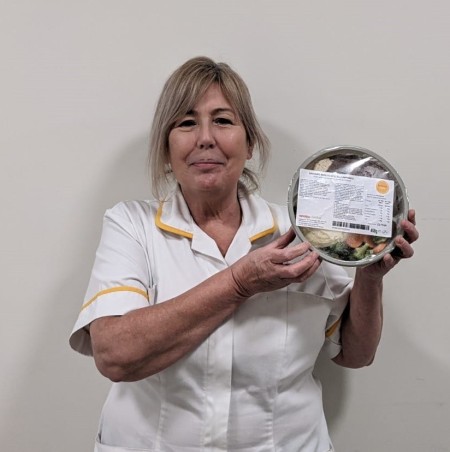Publish date: 21 January 2022
Specialist nutrition support for patients with hip fractures

Patients recovering from hip fractures in Northumberland are benefitting from additional nutritional support during their stay in hospital.
Three dedicated nutritional assistants are supporting hip fracture patients on Ward One at The Northumbria Specialist Emergency Hospital in Cramlington by helping them with wider options for meals and extra snack choices to aid their recovery.
The nutrition assistants are working closely with the catering team at the hospital to introduce smaller-portion and higher-calorie meals including fortified soups and a wide range of high-calorie snacks. They are also working with Apetito foods to provide a range of full meals delivered in bitesize portions to help patients who need that extra encouragement and support to eat independently.
Barry Fletcher, who has been a patient on Ward One, said: “I was really surprised at the choice of meals and snacks on offer during my stay in hospital. You have this idea in your head that hospital food isn’t very nice and that’s not the case at all from my experience.
“The nutritional assistant has been really helpful and I’ve loved the cooked breakfasts. I’ve also been having chicken and beef dinners with lots of veg too which I have really enjoyed. It’s good to know I am getting enough calories with what I was choosing.”
The assistants are developing easy-read picture cards with calorie information to help give patients greater understanding and choice which is tailored to their personal tastes and mirrors what they like to eat at home.
Hip fracture patients need to have enough calories, energy and protein to rebuild their muscles and tissues and are required to have at least three meals per day as well as 500 extra calories in snacks.
This is not only during their initial three-day stay on Ward One after their operation but also during their rehabilitation period – whether this be at home or another hospital site. This continual good nutrition and hydration also helps to reduce confusion and delirium which in turn, can reduce the risk of falling.
Ann Bradford, nutritional assistant at Northumbria Healthcare said: “Hip fractures are one of the most common and serious injuries in older people. As many of our hip fracture patients are elderly they already fall in to a high-risk category.
“It is vital that we make sure these patients get enough calories and protein to build up their energy so that they can become stronger again.”
The initiative – known as HIPQIP2 – is part of the successful Hip Quality Improvement Programme (HIPQIP), which is being hosted by Northumbria Healthcare NHS Foundation Trust, and highlights that good nutrition saves lives.
So far, HIPQIP has enabled an extra 29,000 meals to be provided, 119 lives to be saved and an extra 200 people return to their own homes than would previously have been the case.
